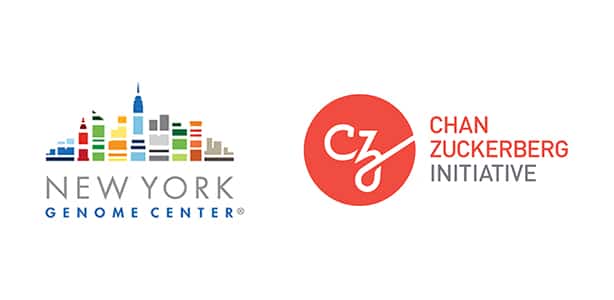The Chan Zuckerberg Initiative (CZI) has awarded a one-year pilot grant for a collaboration between principal investigators Rahul Satija, PhD, Core Faculty Member at the New York Genome Center (NYGC) and Assistant Professor of Biology at New York University, and Peter Smibert, PhD, Manager, NYGC Technology Innovation Lab. The project has been made possible in part by a grant from the Chan Zuckerberg Initiative donor advised fund, an advised fund of Silicon Valley Community Foundation. It will support Dr. Satija and Dr. Smibert’s work on the Human Cell Atlas (HCA) project, the international collaborative effort to create a comprehensive reference map of all human cells as a resource for studies of health and disease.
The grant funds the project entitled “Enhanced massively parallel and multimodal profiling for the Human Cell Atlas,” and is focused on the benchmarking and optimization of CITE-seq, a powerful new technology to simultaneously measure protein and RNA levels in single cells, developed by the NYGC Technology Innovation Lab in close collaboration with the Satija Lab.
“Our objective is to illuminate CITE-seq as a powerful tool to discover and characterize human cell types,” said Dr. Satija. “We look forward to working with CZI to establish benchmarks, best-practices, and open-source analytical tools that will enable researchers across the Human Cell Atlas community.”
CITE-seq, or Cellular Indexing of Transcriptomes and Epitopes by sequencing, couples the measurement of surface protein markers on thousands of single cells with simultaneous sequencing of the messenger RNA (mRNA) of those same single cells. The protein detection component of CITE-seq is based on DNA-barcoded antibodies, which produce a sequencable readout that is captured along with the transcriptome of the cell. This approach enables CITE-seq to significantly expand the number of proteins that can be multiplexed in a single experiment, compared to flow- and mass-cytometry-based approaches, while maintaining compatibility with a wide variety of existing high-throughput single cell sequencing methods. “These ‘multimodal’ measurements provide a richer profile for each cell compared to separate quantification of RNA or protein measurements, and can boost the statistical power needed to discover new groups of cells,” said Dr. Smibert.
The request for applications from the CZI called for proposals that would develop and characterize single cell technologies for use in the Human Cell Atlas project. The funded project will benchmark CITE-seq against alternative approaches, but also aims to develop guidelines for assembling and optimizing large antibody panels. The proposal is largely focused on the human immune system. A key element of the study will be a focused analysis of human T cells, which exhibit subtle transcriptomic differences that are poorly separated by single-cell RNA sequencing alone and therefore present an ideal system for multimodal analysis. However, the technology has the potential to study a wide range of human tissues. “We are committed to making all protocols and data readily available to the community, and hope that this will help researchers adopt CITE-seq for their own work,” said Dr. Smibert.
Alongside experimental guidelines, the pilot grant will also drive the creation of open-source computational tools for CITE-seq analysis. “The ability to quantify single cell protein levels with DNA sequencing requires us to develop new statistical methods,” said Dr. Satija, “particularly when we have paired estimates of gene expression as well”. “We’re excited to develop freely available methods to enable CITE-seq data to be broadly analyzed by the HCA community and expect that these methods can be extended to other data types, including epigenetic multimodal profiling strategies.” The CITE-seq toolkit will be released as part of the Seurat package, an open-source toolkit maintained by the Satija Lab for the analysis, interpretation, and exploration of single cell genomic data.
About the New York Genome Center
The New York Genome Center (NYGC) is an independent, nonprofit academic research institution at the forefront of transforming biomedical research and clinical care. Founded as a collaborative venture by the region’s premier academic, medical and industry leaders, the New York Genome Center’s goal is to translate genomic research into new diagnostics, therapeutics and treatments for human disease. NYGC member organizations and partners are united in this unprecedented collaboration of technology, science and medicine, designed to harness the power of innovation and discoveries to advance genomic services. Their shared objective is the acceleration of medical genomics and precision medicine to benefit patients around the world.
Member institutions include: Albert Einstein College of Medicine, American Museum of Natural History, Cold Spring Harbor Laboratory, Columbia University, Hospital for Special Surgery, The Jackson Laboratory, Memorial Sloan Kettering Cancer Center, Icahn School of Medicine at Mount Sinai, New York-Presbyterian Hospital, The New York Stem Cell Foundation, New York University, Northwell Health, Princeton University, The Rockefeller University, Roswell Park Cancer Institute, Stony Brook University, Weill Cornell Medicine and IBM. For more information on the NYGC, please visit nygenome.org.
About the Chan Zuckerberg Initiative
The Chan Zuckerberg Initiative was launched in December 2015 by Mark Zuckerberg, founder and CEO of Facebook, and his wife, Priscilla Chan, a pediatrician and founder and CEO of The Primary School in East Palo Alto. The Chan Zuckerberg Initiative is a new kind of philanthropic organization dedicated to advancing human potential and promoting equal opportunity through world class engineering, grantmaking, impact investing, policy, and advocacy work. Initial areas of focus include supporting science through basic biomedical research and education through personalized learning. CZI is also exploring ways to build stronger, more equitable communities through affordable housing and criminal justice reform.
